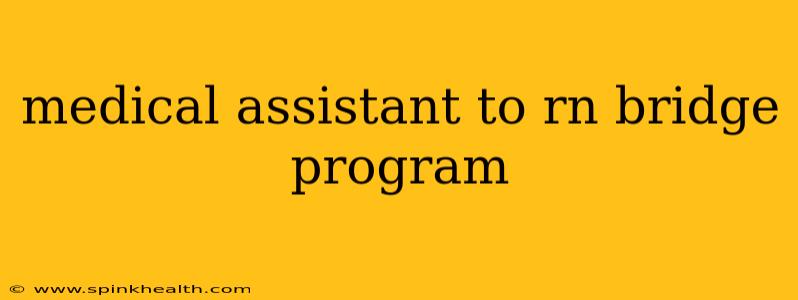The crisp white coat, the comforting hand on a worried patient's shoulder, the quiet satisfaction of making a difference – these are images that drew many of us to healthcare. For those who started their journey as Medical Assistants (MAs), the dream of becoming a Registered Nurse (RN) might feel both attainable and daunting. The good news is that bridging the gap is entirely possible, and many programs are designed to help MAs transition smoothly into RN roles. This journey isn't always easy, but the rewards are immense. Let's explore the path from medical assistant to RN.
What is a Medical Assistant to RN Bridge Program?
A Medical Assistant to RN bridge program is specifically designed for certified or experienced medical assistants who want to pursue a career as a registered nurse. These programs recognize the existing knowledge and skills MAs already possess, allowing them to bypass certain introductory courses and focus on the advanced nursing concepts they need to master. Think of it as a fast track – leveraging your existing foundation to accelerate your progress.
What are the advantages of a Bridge Program?
Choosing a bridge program offers several key advantages:
- Accelerated Learning: By building upon your existing medical knowledge, you'll complete the program faster than starting a traditional nursing program from scratch. This translates to quicker entry into the rewarding field of nursing.
- Cost Savings: While the exact savings will vary depending on the program and your individual circumstances, the reduced course load often means lower tuition costs compared to a full RN program.
- Seamless Transition: Bridge programs often incorporate clinical experience that directly builds on your MA background, allowing for a smoother and more confident transition into the more advanced responsibilities of an RN.
- Targeted Curriculum: The curriculum is tailored to address the specific knowledge gaps between an MA's skill set and the RN competencies. This focused approach maximizes efficiency and minimizes redundancy.
What are the prerequisites for a Medical Assistant to RN Bridge Program?
Prerequisites vary from institution to institution, but generally include:
- Certified Medical Assistant (CMA) or Registered Medical Assistant (RMA) certification: This is usually a fundamental requirement.
- Minimum GPA: Most programs have a minimum grade point average (GPA) requirement, typically in the range of 2.5 to 3.0 or higher.
- Specific coursework: Some programs may require completion of prerequisite courses in science subjects like anatomy, physiology, and microbiology.
- Background check and health screenings: As with any healthcare program, you'll need to undergo background checks and health screenings to ensure you meet the standards for clinical practice.
How long does a Medical Assistant to RN bridge program take?
The duration of a bridge program can vary. Some programs can be completed in as little as 12-18 months, while others might take longer depending on the program's structure and the student's existing coursework.
What are the career prospects after completing a Medical Assistant to RN bridge program?
Upon successful completion, graduates are eligible to take the NCLEX-RN exam, the national licensing exam for registered nurses. This opens doors to a wide range of nursing opportunities across diverse healthcare settings, from hospitals and clinics to long-term care facilities and home healthcare.
Is a Medical Assistant to RN Bridge Program Right for Me?
This is a deeply personal decision. Consider your learning style, financial situation, and career goals. If you're a dedicated and motivated MA who's eager to expand your career prospects within healthcare, a bridge program could be an excellent path. It's crucial to research different programs, compare their requirements, and weigh the pros and cons before making your choice. Talking to current students or alumni of bridge programs can provide invaluable insights into the program's strengths and challenges. The journey from MA to RN is challenging, but it’s a deeply rewarding one, filled with opportunities to make a tangible difference in people's lives. Are you ready to take the next step?

